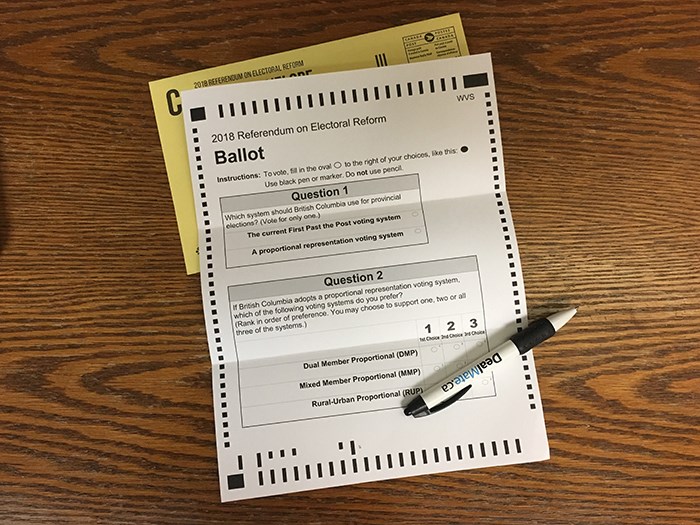Accountable direct local representation is a hallmark of our current first-past-the-post electoral system, a system where constituents know their member of the legislative assembly and the MLA is responsible for the needs of the communities he or she serves. With Proportional Representation, we would be moving away from this direct voter relationship to a vague party-driven system where your representative could very well live in some other part of the province.
I’ve been involved in municipal, regional and provincial government for at least the last 15 years and have come to be certain of the value of knowledgeable, local and direct representation.
In 2004 and 2005, I followed with interest the Citizens’ Assembly on Electoral Reform, a non-partisan review and recommendation process that unlike today was populated by and driven by citizens, not politicians. After nearly two years, the Assembly delivered a report to the BC Legislature recommending a system called BC-STV. Accompanied by a hard-to-argue-with tagline of “make every vote count,” in 2005 I was swayed and voted in favour of proportional representation (PR), at the time not really appreciating the potential implications. Regardless that referendum failed.
But, in 2005, I also became the mayor of Pemberton and, over the course of the next four years, I learned how very important it is to have a local elected provincial representative who is uniquely accountable to my community. It became very clear to me that the issues that are important to the Pemberton Valley, the Sea to Sky Corridor or any community of interest outside the big metropolitan areas, are by nature more regionally and locally specific. Special projects, transportation, local health care and education issues, economic development priorities and more are better managed and monitored when you have an accountable politician.
In 2009, there was a second vote on proportional representation. This time, the number of MLAs per riding, and maps for the proposed riding boundaries, were published. This new information confirmed in my mind that the Sea to Sky’s influence would be diminished if we went to a PR system. Our voice would be overwhelmed by super-sized ridings, little or no MLA accountability and conflicting priorities. We would be absorbed within Metro Vancouver and move from a riding of 50,000 people to 250,000 people. With a total population of 35,000 people, the Sea to Sky would become a rounding error with a little voice. In the second referendum, lack of local representation and accountability was a showstopper for me and so I voted in opposition to PR and to this day I haven’t changed my mind.
Be it Mixed Member, Dual Member or Rural-Urban, by the very nature of PR, ridings must get bigger in order to create space for the proportionality and reflect the five per cent of the vote threshold that gets the parties appointed MLAs.
Under what is currently being proposed, to suggest knowledge of a particular view of the future political landscape is disingenuous. To believe that special interest advocacies won’t meet that five per cent threshold needed to elect members is naïve and is certainly not the experience in other jurisdictions. Here in B.C., where in 2001 the Marijuana Party received 3.2 per cent of the vote without any hope of electing a member, we should recognize that a five per cent threshold is quite doable. Depending on how many votes you are entitled to cast per election (this will be decided by the NDP and Greens at a later date) throwing one vote to a special interest is predictable. Imagine you rely on BC Ferries and are provided an opportunity to give a “BC Free Ferry Party” your vote and perhaps the balance of power. The five per cent threshold to elect MLAs is then a pretty low bar.
I hear the Greens and the NDP going on about a more co-operative approach. Well we are currently living one version of our future, the Greens and the NDP show no sign of governing in a more cooperative manner. Amendments to bills are rejected not because they are not thoughtful but because they are generated by the Opposition. Committees are formed such as the Rental Taskforce and the Opposition is excluded. Conferences are held and the Opposition is denied access. This isn’t a co-operative government – this is a government that with their minority Green partners simply seeks to keep their grip on power.
At the end of the day the “Art of the Deal” will dominate – the makeup of the government will be decided behind closed doors by backroom power brokers. It will be high stakes poker, with your government at play. As the Greens Party leader Andrew Weaver famously said, election promises are “irrelevant” and with Proportional Representation, truer words were never said. By the time coalition negotiations are complete all accountability will be buried, your MLA may be party appointed and the never ending struggle to maintain the tenuous grip on power will dominate. This is not fearmongering, this is the future as I see it.
Jordan Sturdy can be reached at [email protected].




